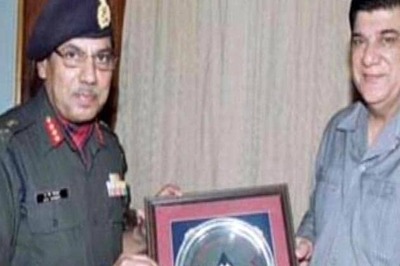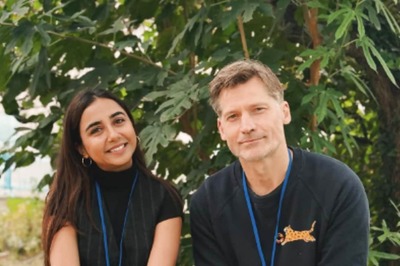
views
Public broadcaster Prasar Bharati will explore the feasibility of providing a bigger share of Doordarshan (DD) and All India Radio (AIR) airtime to Nepali programmes, specifically to cater to the Gorkhas of West Bengal in light of multiple requests from them, News18.com has learnt.
“The feasibility of airing more local Nepali content for north Bengal will be studied. But, we’ll first need to check the availability of requisite infrastructure and local talent,” a senior government official told News18.com.
Sources in the government told News18.com that Prasar Bharati, the parent body of the state-owned DD and AIR, periodically receives requests to air multiple local language broadcasts from across the country.
“There are several such requests for local language broadcasts that we periodically receive from various regions. We try to accommodate such requests to the extent possible,” the official quoted above said.
The Demand
The Gorkha population of West Bengal, primarily based in the hills of Darjeeling, Kurseong and surrounding areas in the northern part of the state, has time and again demanded more AIR and DD airtime for Nepali language programmes.
Three local AIR stations operate in the region at present, including in Darjeeling, Kurseong and Siliguri. The Kurseong station has been producing and airing substantial number of local Nepali programmes and news for the Gorkha audience, aside from those in Bhutanese, Tibetan, English, Hindi and Bengali.
However, the Siliguri station airs the majority of programmes in Bengali, as its target audience has been the Bengali population. The Darjeeling station, a smaller one compared to the other two, relays a majority of Nepali programmes.
This has festered into a political issue, with the Gorkhas seeking to exert their identity by often raising demands, one of which is for an increase in airtime for Nepali content broadcasts. Some of them have also alleged that they are forced to depend on other Nepali channels on TV and radio for consumption of news and entertainment.
A senior AIR official explained that while Nepali broadcasts have always been given importance in the region, especially in Kurseong and Darjeeling, there have been demands for increase in airtime and more radio and TV stations that air Nepali language content.
For instance, after the AIR ordered the shutdown of a short wave transmitter in Kurseong on July 30, 2019 and replaced it with an FM transmitter instead, many Nepali programmes continued, but their reach went down significantly in the hills. The move was part of rationalisation of 21 non-functional short wave transmitters across the country.
“FM signals cannot traverse the hilly terrains of the region. Thus, currently the signals are not reaching much of the Gorkha population,” the official explained.
As far as the Siliguri station is concerned, some of the Nepali programmes aired were relayed from the foreign language services division. But with many of the short and medium wave transmitters used for broadcast of foreign languages being rationalised, that is likely to have been affected too, the official said.
This is perhaps what has brought the demands to the fore again.
Raju Bista, BJP MP from Darjeeling, said the Kurseong short wave transmitter wasn’t defunct and sought its upgrade. “The Kurseong station was established in 1962 and broadcasts programmes mostly in Nepali language. Removing SW transmitters has affected the telecast from the Kurseong radio station as FM signals will not be so strong,” he said.
However, the first government official quoted above said that the decision was taken since short wave transmitters are “losing relevance”.
“This was part of an overall revamp of AIR services wherein services were bunched into two world service streams and two neighbourhood streams. They air significant Nepali content,” the official said.
Politically Sensitive North Bengal
Politically, north Bengal has assumed greater relevance nationally in the last few years. Bengal’s ruling Trinamool Congress did not perform well here in the most recent state elections, despite a getting a thumping majority. The Rajbongshi votes went to the BJP, and the TMC wants to reclaim this lost space.
Out of 42 Assembly seats in six districts of North Bengal, the BJP won 25. This seems to be an area of concern for the TMC.
The central government has appointed two ministers from here – Rajbonshi face Nisith Pramanik as MoS, Ministry of Home Affairs and John Barla from the tribal community. New Bengal BJP chief Sukanto Majumdar is also from Balurghat in north Bengal.
Both ministers are trying to convey the central government’s emphasis on north Bengal through a Samman Yatra.
John Barla has even demanded that north Bengal be carved into a separate Union Territory, with a section of BJP leaders supporting him.
Chief Minister Mamata Banerjee, too, has visited north Bengal multiple times and has made a separate secretariat in Jalpaiguri, but the BJP has focused on “underdevelopment” in the area.
Making a Political Statement
Vikram Rai, a professor and Darjeeling resident, claimed that Nepali programmes are no longer aired on TV or radio. “We have been long demanding an FM channel (for Nepali programmes) in the hills and have written multiple letters to the authorities. That is pending too… Nepali language is our identity,” he said.
Suman Lakandri, a singer from the region, said local artistes and singers in and around the hills have no dearth of talent, but lack media exposure. “Talent is being wasted. Doordarshan should start a full-time Nepali channel,” he said.
However, the AIR official quoted previously said that with the proliferation of private and community radio stations airing Nepali content, the Gorkha population has many other options to consume Nepali content other than AIR and DD.
“But their demand for a larger space for Nepali language broadcasts in AIR and DD remains. It’s more of a recognition of the political point Gorkhas have been trying to make over the years,” he said.
Read all the Latest News , Breaking News and IPL 2022 Live Updates here.



















Comments
0 comment